Kneading bread dough offers a treasure trove of stress-melting benefits. You'll experience mindfulness as you focus on the present moment, engaging all your senses. The repetitive motion acts as a moving meditation, calming your mind and lowering blood pressure. It's a form of low-impact exercise that releases mood-boosting endorphins. The aroma of fresh bread provides natural aromatherapy, while the creative process satisfies your artistic side. Kneading distracts you from anxious thoughts, teaches patience, and nurtures both yourself and others. You'll feel a profound sense of accomplishment and boost your self-esteem. Discover how this simple act can transform your mental well-being.
Stress Relief Through Repetitive Motion
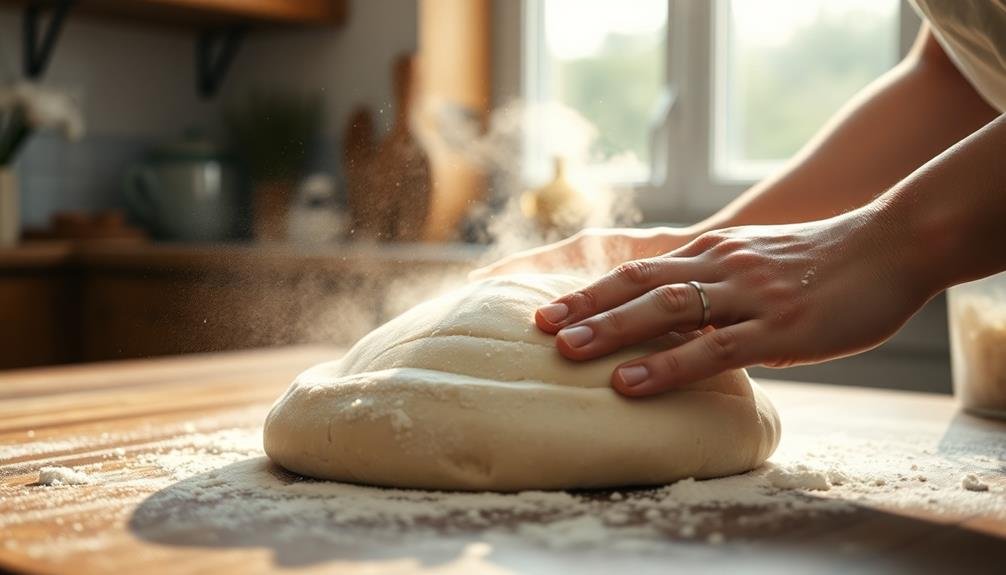
The repetitive motion of kneading bread dough can be a surprisingly effective stress-reliever. As you work the dough, you'll notice your mind starting to clear and your muscles relaxing. This rhythmic activity engages your hands and arms, creating a meditative state that helps you focus on the present moment.
You'll find that kneading dough allows you to channel your energy and frustrations into a productive task. The physical exertion releases endorphins, your body's natural stress-fighters, which can improve your mood and reduce anxiety. As you push, fold, and turn the dough, you're not just creating bread – you're also working out tension in your body.
The tactile sensation of the dough beneath your fingers can be grounding, pulling you away from racing thoughts and worries. You'll become more aware of your breath and the steady tempo of your movements, which can naturally slow your heart rate and lower blood pressure.
This mindful practice can help you develop a sense of calm that extends beyond your baking session, giving you tools to manage stress in other areas of your life.
Mindfulness in the Kitchen
When you knead bread dough, you're practicing mindfulness in the kitchen.
You'll focus on the present moment, letting go of worries about the past or future.
As you work the dough, engage all five senses – feel its texture, smell the yeast, listen to the sounds of kneading, watch the dough change, and anticipate its taste.
Focus on Present Moment
Bread dough, with its yielding texture and earthy aroma, offers a perfect opportunity to practice mindfulness in the kitchen. As you knead, you're forced to focus on the present moment, engaging all your senses in the process.
Feel the dough's texture change beneath your fingers, from sticky to smooth. Notice how it becomes more elastic with each fold and press.
Listen to the rhythmic sound of your hands working the dough. Inhale deeply, taking in the yeasty scent that fills the air. Observe the subtle changes in color as the ingredients blend together. This sensory experience anchors you firmly in the now, pushing away thoughts of past worries or future anxieties.
You'll find that kneading bread dough naturally slows your breathing and calms your mind. It's a form of moving meditation that doesn't require special training or equipment.
As you work, let go of distractions and immerse yourself fully in the task at hand. This practice of present-moment awareness can extend beyond breadmaking, helping you cultivate mindfulness in other areas of your life.
Engage All Five Senses
Through the process of breadmaking, you can engage all five senses, creating a rich, multisensory experience that enhances mindfulness.
As you knead the dough, feel its texture change beneath your fingertips, evolving from sticky to smooth. Listen to the rhythmic sound of your hands working the dough, a soothing repetition that can lull you into a meditative state.
Inhale deeply and savor the yeasty aroma that fills the kitchen, signaling the start of fermentation.
Watch as the dough transforms, rising and doubling in size before your eyes. When it's time to shape the loaf, you'll notice how the dough's elasticity has developed, allowing you to mold it with ease.
Physical Exercise for Mental Health
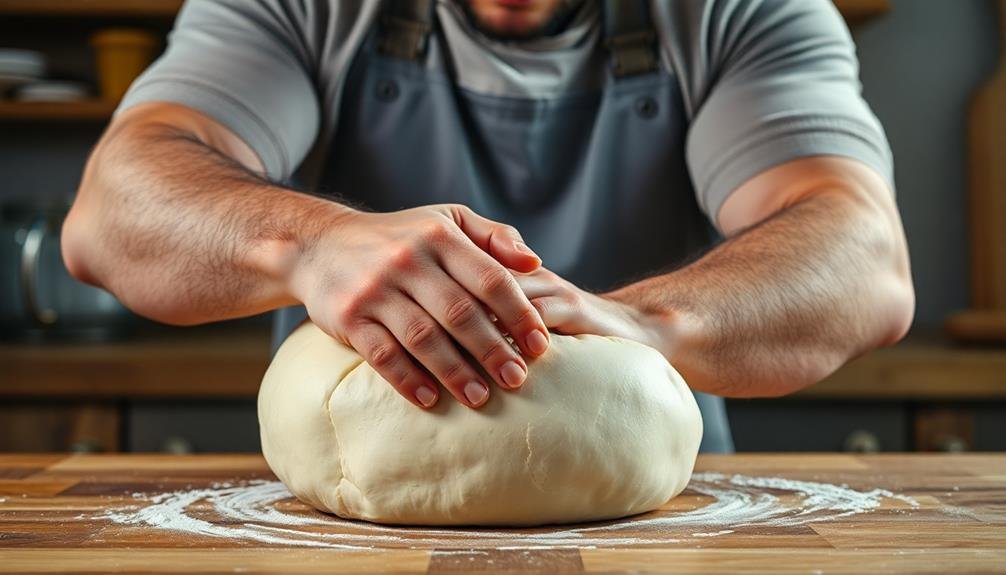
While kneading bread dough offers unique stress-relief benefits, it's also a form of physical exercise that contributes to mental health. As you work the dough, you're engaging in a low-impact, repetitive activity that gets your body moving and your blood flowing. This physical exertion releases endorphins, the body's natural mood elevators, which can help reduce stress and anxiety.
The rhythmic motion of kneading can also serve as a form of moving meditation, allowing you to focus on the present moment and clear your mind. This mindfulness practice can greatly improve your mental well-being and emotional balance.
Here's how kneading bread dough compares to other stress-relieving activities:
| Activity | Physical Exertion | Mindfulness | Creativity |
|---|---|---|---|
| Kneading Bread | Moderate | High | High |
| Yoga | Moderate | High | Low |
| Jogging | High | Moderate | Low |
| Painting | Low | High | High |
Aromatherapy From Fresh Bread
The aroma of freshly baked bread is one of life's simple pleasures, offering a form of natural aromatherapy that can instantly lift your mood. As you knead the dough, you'll release the first hints of that comforting scent. The yeasty fragrance stimulates your olfactory system, triggering positive emotions and memories.
When you bake the bread, the Maillard reaction creates complex aromas that fill your home. These scents can reduce stress and anxiety, promoting a sense of calm and well-being. The smell of fresh bread activates the limbic system in your brain, which is responsible for emotions and memory. This can evoke feelings of comfort, safety, and nostalgia.
Moreover, the aroma of baking bread can stimulate appetite and increase saliva production, aiding digestion. It's also been shown to improve cognitive function and enhance mood.
You'll find that the scent lingers long after baking, continuing to provide aromatherapeutic benefits. By engaging in bread-making, you're not just creating a delicious treat; you're also surrounding yourself with a natural stress-reducer and mood-enhancer.
Creative Expression and Satisfaction
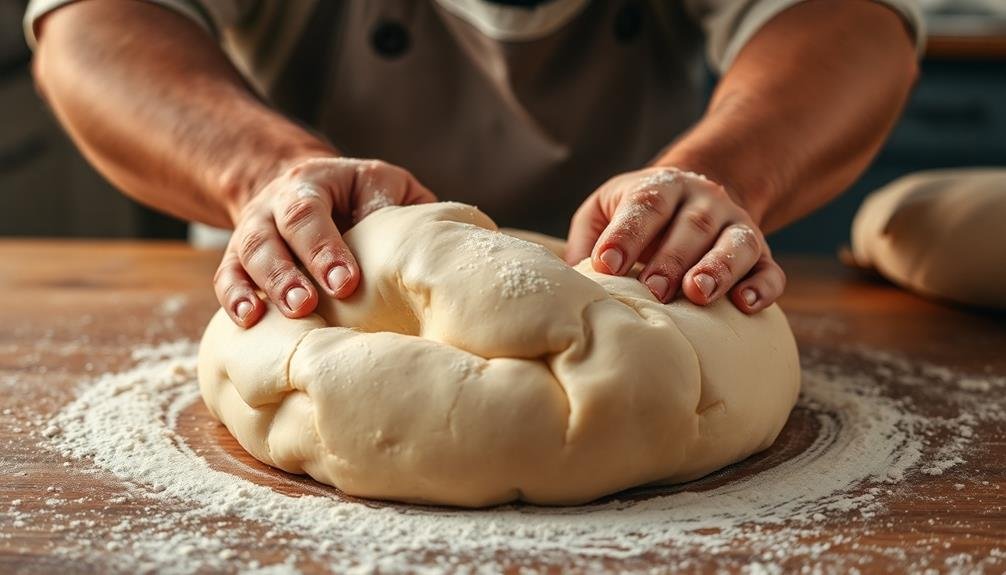
You'll find that kneading bread dough offers a unique artistic outlet for your creativity.
As you shape and mold the dough, you're free to experiment with different techniques and forms, releasing your inner baker-artist.
At the end of the process, you'll have created a tangible, edible accomplishment that brings a sense of pride and satisfaction.
Artistic Outlet Unleashed
Kneading bread dough isn't just a culinary necessity; it's a canvas for creativity. As you work the dough, you'll find yourself experimenting with different techniques and patterns. You might create intricate swirls, pleats, or braids, transforming the simple act of kneading into an artistic expression.
Your hands become sculpting tools, shaping the dough into unique forms. You can add seeds, herbs, or dried fruits to create visually appealing textures and patterns. The process allows you to play with colors, mixing in ingredients like spinach or beetroot for natural hues.
As you knead, you'll develop a sense of the dough's elasticity and texture, fine-tuning your artistic instincts. You'll learn to read the dough's response to your touch, adjusting your technique for ideal results. This tactile experience engages your senses and encourages mindfulness.
The artistic outlet extends beyond the kneading process. You can experiment with scoring patterns on the loaf's surface before baking, creating beautiful designs that bloom in the oven. Each loaf becomes a unique masterpiece, reflecting your personal style and creativity.
Tangible Accomplishment Created
Transforming simple ingredients into a delicious loaf of bread provides a profound sense of accomplishment. As you knead the dough, you're not just mixing flour and water; you're creating something tangible and nourishing. This process allows you to see, feel, and eventually taste the results of your efforts.
When you pull a freshly baked loaf from the oven, you'll experience a rush of pride and satisfaction. You've taken raw ingredients and, through your own skill and patience, turned them into something beautiful and delicious. This tangible outcome serves as a powerful reminder of your capabilities and creativity.
The act of bread-making also offers a unique opportunity for mindfulness. As you focus on the task at hand, you're fully present in the moment, engaging all your senses. This heightened awareness can help you appreciate the small joys in life and find fulfillment in simple activities.
Moreover, sharing your homemade bread with others can bring additional satisfaction. You're not just feeding people; you're sharing a piece of your creativity and hard work, fostering connections and creating lasting memories.
Tactile Sensory Stimulation
The cool, soft texture of bread dough beneath your fingers is a sensory delight. As you knead, you'll experience a range of tactile sensations that can help melt away stress and ground you in the present moment. The dough's elasticity and resistance provide a satisfying pushback against your palms, creating a rhythmic, almost meditative experience.
You'll notice the dough's texture changing as you work it, becoming smoother and more pliable. This transformation engages your senses, keeping your mind focused on the task at hand and away from stressors. The tactile stimulation can also trigger the release of endorphins, promoting a sense of well-being.
| Kneading Stage | Texture | Sensation | Stress-Relief Effect |
|---|---|---|---|
| Initial | Rough | Grainy | Grounding |
| Middle | Sticky | Clingy | Focusing |
| Later | Smooth | Silky | Calming |
| Final | Elastic | Springy | Satisfying |
As you continue kneading, you might find yourself entering a flow state, where time seems to slow down and your worries fade into the background. The repetitive motion of pushing, folding, and turning the dough can become a form of moving meditation, allowing you to fully immerse yourself in the sensory experience and find a moment of peace in your busy day.
Distraction From Anxious Thoughts
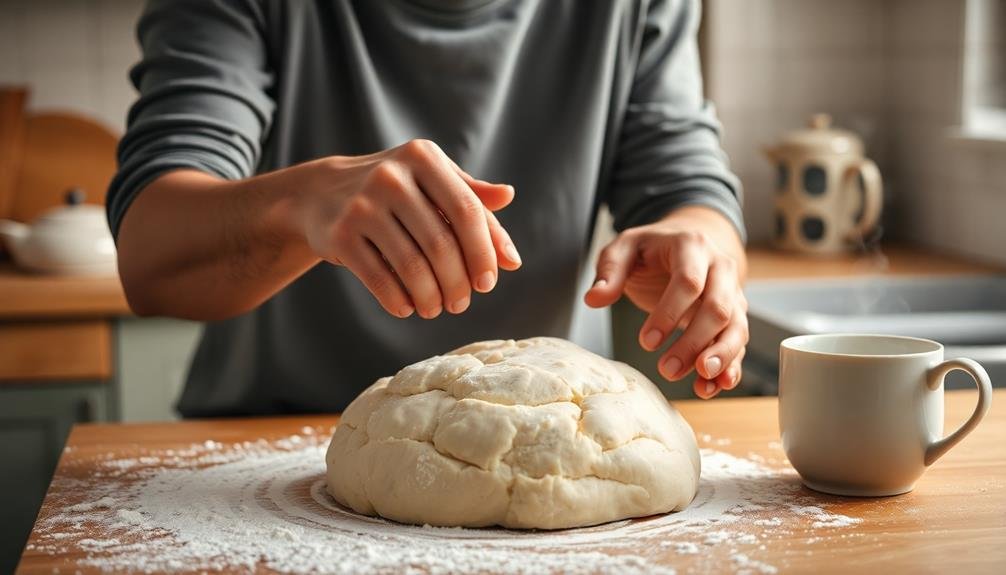
When anxious thoughts threaten to overwhelm you, kneading bread dough can provide a powerful distraction. As you focus on the repetitive motion of pushing, folding, and stretching the dough, your mind shifts away from worry and stress. This simple act demands your attention, forcing you to be present in the moment.
You'll find that the process of kneading requires concentration on technique, timing, and texture. These elements work together to redirect your thoughts from anxious rumination to the task at hand. As you work the dough, you're engaging in a form of mindfulness, anchoring yourself to the physical sensations and immediate experience.
The rhythmic nature of kneading can also induce a meditative state, further helping to quiet your racing mind. You might notice your breathing naturally slowing and becoming more regular as you fall into the rhythm of the kneading process.
This physical activity, combined with the focus it requires, creates a mental break from stressors and allows your mind to reset.
Nurturing Self and Others
When you bake bread, you're not just nurturing yourself but also those around you.
Sharing your homemade loaves can be a powerful act of love, fostering connections and creating lasting memories.
Through regular baking rituals, you'll bond with family and friends while nourishing both body and soul with wholesome, comforting sustenance.
Sharing Homemade Bread Love
Bakers who share their homemade bread with others often find they're nurturing more than just appetites.
You're creating meaningful connections and spreading joy with every loaf you give away. When you offer a freshly baked bread to a friend, neighbor, or coworker, you're sharing a piece of yourself and your time.
The act of giving homemade bread can foster a sense of community and strengthen relationships. You'll find that people appreciate the effort and care you've put into creating something from scratch. It's a gesture that says, "I value you enough to share this labor of love."
Don't be surprised if your bread-sharing inspires others to start baking too. You might find yourself swapping recipes, tips, and even sourdough starters with fellow bread enthusiasts.
This shared passion can lead to new friendships and a supportive network of bakers.
Bonding Through Baking Rituals
Beyond sharing bread with others, the act of baking itself can become a powerful bonding experience. When you invite friends or family into your kitchen to bake together, you're creating memories and strengthening relationships. The process of measuring ingredients, kneading dough, and watching it rise fosters teamwork and communication.
Teaching someone to bake bread can be especially rewarding. You're not just sharing a skill; you're passing down a tradition that connects generations. As you guide a child or novice baker through the steps, you'll find yourself engaged in meaningful conversations and shared laughter.
Baking rituals can also nurture self-care. Set aside time each week for solo bread-making as a form of meditation. The repetitive motion of kneading, combined with the sensory experience of working with dough, can help you disconnect from daily stressors and focus on the present moment.
Whether baking with others or alone, the ritual of bread-making offers a unique opportunity to bond with loved ones and yourself. It's a practice that nourishes both body and soul, creating connections that last far beyond the loaf's lifespan.
Nourishing Body and Soul
Through the simple act of kneading bread dough, you're not just creating a delicious loaf; you're nourishing both body and soul. As you work the dough, you're engaging in a mindful practice that connects you to the present moment, alleviating stress and promoting mental well-being. The rhythmic motion of kneading can be meditative, allowing you to focus on the tactile sensation and leave worries behind.
Baking bread also offers numerous benefits for your physical and emotional health:
- It provides a low-impact workout for your hands and arms
- The aroma of freshly baked bread can boost your mood
- Homemade bread often contains fewer additives than store-bought options
- Sharing your creations with others fosters social connections
- The sense of accomplishment boosts self-esteem
When you knead bread dough, you're participating in a time-honored tradition that spans cultures and generations. This process allows you to slow down, appreciate the simple things in life, and create something tangible with your own hands.
Patience and Present Moment Awareness
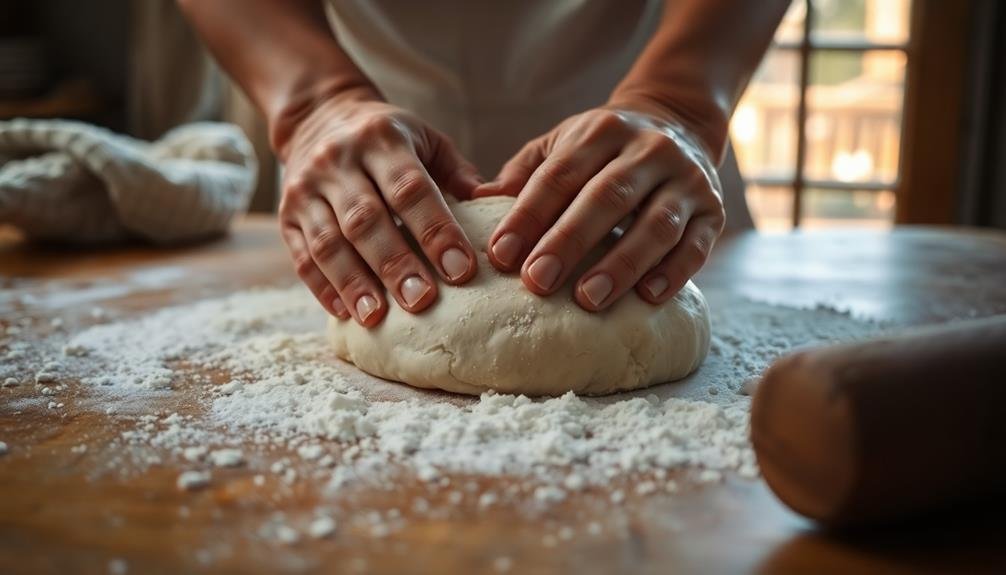
The art of kneading bread dough cultivates patience and present moment awareness. As you work the dough, you're forced to slow down and focus on the task at hand. You can't rush the process; it requires time and attention to develop the gluten properly.
This mindful activity encourages you to be fully present. You'll notice the texture changing beneath your fingers, the aroma of yeast filling the air, and the subtle warmth of the dough. These sensory experiences anchor you to the present moment, helping you let go of worries about the past or future.
| Benefits | Practice |
|---|---|
| Stress reduction | Focus on breath |
| Improved focus | Observe sensations |
| Emotional regulation | Embrace the process |
Kneading bread also teaches you to embrace uncertainty. You can't always predict how the dough will behave, but you learn to trust the process. This patience and acceptance can carry over into other areas of your life, helping you navigate challenges with a calmer mindset. By regularly engaging in this tactile meditation, you'll develop a greater capacity for staying present and finding peace in the simple act of creating something nourishing.
Accomplishment and Self-Esteem Boost
Kneading bread dough can greatly boost your self-esteem and sense of accomplishment. As you work the dough, you're creating something tangible with your own hands. This process allows you to witness the transformation of simple ingredients into a nourishing staple, giving you a profound sense of achievement.
The act of kneading bread offers numerous benefits that contribute to your self-esteem:
- You're developing a valuable life skill
- You're engaging in a productive, creative activity
- You're nurturing yourself and others through food
- You're connecting with age-old traditions
- You're mastering a craft that improves with practice
As you become more proficient in bread-making, you'll likely feel a growing sense of pride in your abilities. You'll be able to share your creations with friends and family, further enhancing your self-worth.
The satisfaction of pulling a perfectly baked loaf from the oven is incomparable, and knowing that you've crafted it from scratch can be incredibly empowering. This sense of accomplishment can spill over into other areas of your life, boosting your overall confidence and motivation to tackle new challenges.
Frequently Asked Questions
Can Kneading Bread Dough Help With Arthritis or Joint Pain?
Kneading bread dough might offer some relief for arthritis and joint pain. You're engaging your hands in gentle, repetitive motions that can improve flexibility and circulation. However, it's best to consult your doctor before using this as therapy.
How Long Should I Knead Bread Dough for Optimal Stress Relief?
For ideal stress relief, you'll want to knead bread dough for about 10-15 minutes. This duration allows you to fall into a rhythmic motion, clear your mind, and release tension. You'll feel more relaxed as you work the dough.
Are There Gluten-Free Alternatives That Provide Similar Stress-Relieving Benefits?
You can find gluten-free alternatives for stress relief. Try kneading dough made from rice flour, almond flour, or coconut flour. These options provide similar tactile sensations and can help you unwind while creating delicious gluten-free treats.
Can Children Participate in Bread Kneading as a Stress-Relief Activity?
You can involve children in bread kneading for stress relief. It's a fun, tactile activity that helps them release energy and emotions. Just make sure you're supervising, using safe ingredients, and adjusting the dough size for their strength.
Does the Type of Flour Used Affect the Stress-Relieving Properties?
The type of flour doesn't affect stress relief when kneading bread. You'll experience the same calming benefits regardless of the flour used. It's the act of kneading itself that helps you unwind and relax.
In Summary
You've discovered the therapeutic power of kneading bread dough. It's not just about creating a delicious loaf; it's a journey of self-care and mindfulness. As you work the dough, you're releasing stress, engaging your senses, and nurturing your well-being. Remember, each time you knead, you're not only shaping bread but also molding a calmer, more centered version of yourself. Embrace this simple yet profound practice as a regular part of your stress-relief routine.


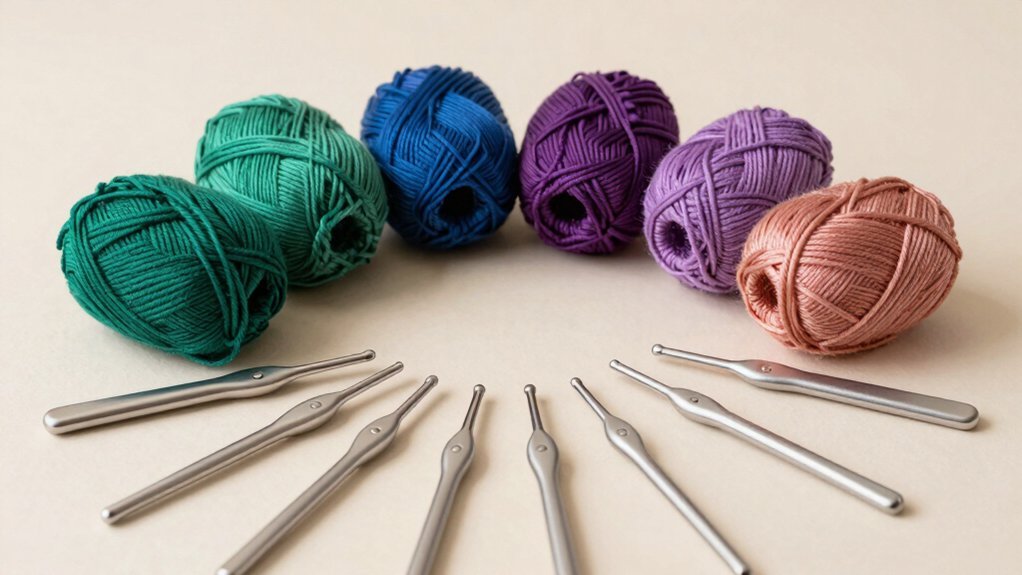


Leave a Reply